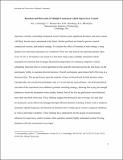Boredom and Distraction in Multiple Unmanned Vehicle Supervisory Control
Author(s)
Mastracchio, C.; Cummings, Mary L; Thornburg, Kristopher; Mkrtchyan, Armen Ashot
DownloadCummings_Boredom and.pdf (2.104Mb)
OPEN_ACCESS_POLICY
Open Access Policy
Creative Commons Attribution-Noncommercial-Share Alike
Terms of use
Metadata
Show full item recordAbstract
Operators currently controlling unmanned aerial vehicles report significant boredom, and such systems will likely become more automated in the future. Similar problems are found in process control, commercial aviation and medical settings. To examine the effect of boredom in such settings, a long-duration low-task-load experiment was conducted. Three low-task-load levels requiring operator input every 10, 20 or 30 min were tested in a 4-h study, using a multiple unmanned vehicle simulation environment that leverages decentralized algorithms for sometimes-imperfect vehicle scheduling. Reaction times to system-generated events generally decreased across the 4 h, as did participants' ability to maintain directed attention. Overall, the participants spent almost half of the time in a distracted state. The top performer spent the majority of time in directed and divided attention states. Unexpectedly, the second-best participant, only 1% worse than the top performer, was distracted for almost one-third of the experiment, but exhibited a periodic switching strategy, allowing himself to pay just enough attention to assist the automation when needed. Indeed, four of the five top performers were distracted for more than one-third of the time. These findings suggest that distraction due to boring, low-task-load environments can be effectively managed through efficient attention switching. Future work is needed to determine optimal frequency and duration of attention state switches, given various exogenous attributes, as well as individual variability. These findings have implications for the design of and personnel selection for supervisory control systems where operators monitor highly automated systems for long durations with only occasional or rare input.
Date issued
2013-01Department
Massachusetts Institute of Technology. Department of Aeronautics and AstronauticsJournal
Interacting with Computers
Publisher
Elsevier
Citation
Cummings, M.L.; Mastracchio, C.; Thornburg, K.M. and Mkrtchyan, A. "Boredom and Distraction in Multiple Unmanned Vehicle Supervisory Control." Interacting with Computers 25, 1 (January 2013): 34-47 © 2013 The Authors
Version: Original manuscript
ISSN
0953-5438